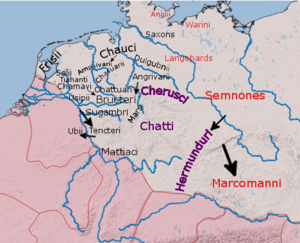Tencteri facts for kids

The Tencteri were an ancient tribe that lived a very long time ago. They moved to the area on the eastern side of the lower Rhine River around 100 BC. We know about them mostly from the writings of famous Roman authors like Julius Caesar and Tacitus. In 2015, archaeologists thought they found signs of the Tencteri in the Netherlands.
Contents
Who Were the Tencteri?
The Romans called the Tencteri and their neighbors "Germanic" tribes, not "Gauls". However, some of their names and the names of other tribes in the area sound more like Celtic words. This makes their exact background a bit of a mystery!
The name Tencteri might mean something like 'the reliable ones' or 'the closed ones'. It could have been a compliment, showing they were a strong and trustworthy group compared to others.
Tencteri and Usipetes: Caesar's Story
Julius Caesar wrote about the Tencteri and another tribe called the Usipetes. He said they were forced out of their homes by a powerful Germanic tribe called the Suebi. The Suebi were very warlike, which made it hard for other tribes to farm and live peacefully.
The Tencteri and Usipetes probably came from an area near the Weser river in what is now Germany. They were likely friends with the Sigambri tribe, who were their neighbors.
Moving to the Rhine
In the winter of 55 BC, the Tencteri and Usipetes couldn't find new land in their old home. So, they traveled to the mouth of the Rhine River. This was the land of the Menapii, a tribe that lived on both sides of the river and hadn't yet joined the Roman Empire.
The Menapii were scared by how many Tencteri and Usipetes there were. They moved away from their lands east of the Rhine and tried to stop the Germanic tribes from crossing the river.
A Surprise Attack
The Germanic tribes pretended to leave, which made the Menapii think it was safe to return to their lands. But then, the Tencteri and Usipetes cavalry (soldiers on horseback) came back quickly in a surprise night attack. They crossed the river, took the Menapii's boats, and took over their villages. They spent the rest of the winter living off the Menapii's food.
Archaeologists now think this event happened near where the Waal (a part of the Rhine) and the Meuse rivers meet, close to a place called Kessel in the Netherlands.
Caesar Steps In
Caesar was worried about how the Gaulish tribes on the other side of the river might react to these new arrivals. He found out that some Gaulish tribes had tried to pay the Germanic tribes to leave. But the Tencteri and Usipetes had moved even further, reaching the lands of the Condrusi and Eburones tribes. These tribes were protected by the Treveri to their south.
Caesar called a meeting of the Gaulish leaders. He pretended not to know about their attempts to pay off the tribes. Instead, he demanded that they give him cavalry and supplies for a war against the Tencteri and Usipetes.
Negotiations and Battle
The Tencteri and Usipetes sent messengers to Caesar. They bragged about their strength, saying only the Suebi could beat them. They offered to become Caesar's allies and asked him to give them land.
Caesar said no to an alliance as long as they stayed in Gaul. He suggested they settle in the land of the Ubii, another Germanic tribe who had asked for his help against the Suebi. Caesar said there was no land available for them in Gaul.
The messengers asked for a three-day break, or truce, so they could talk to their leaders. But Caesar didn't trust them. He thought they were just trying to buy time for their cavalry to return from raiding. He offered only one day and told his soldiers to be careful and not start a fight.
Even though Caesar's Gaulish horsemen outnumbered them, the Germanic cavalry attacked first. They used a special tactic where a horseman and a foot soldier would attack the same target together. Caesar said they broke the truce. He refused to talk to any more messengers and arrested some who came asking for another truce.
Caesar then led his entire army against the Germanic camp. The Usipetes and Tencteri were completely surprised and had to run away. Caesar's cavalry chased them to where the Rhine and Meuse rivers meet. Many were killed trying to cross the rivers. The few who survived found safety with the Sicambri tribe on the other side of the Rhine.
Later Mentions of the Tencteri
In 16 BC, the Tencteri, Usipetes, and Sicambri tribes crossed the Rhine again and attacked Gaul. A Roman leader named Marcus Lollius was defeated, and the Germanic tribes even captured the flag of a Roman legion!
Later, a Roman writer named Tacitus wrote that the Tencteri lived between the Chatti tribe and the Rhine River, across from the Ubii (who had moved to where the city of Cologne is today). This means the Tencteri had settled in the area that Caesar had once suggested for them.
The Tencteri were also defeated by a Roman general named Drusus.
Even later, some old maps and writings suggest the Tencteri might have moved south along the Rhine, possibly near the Black Forest mountains.
On an old map called the Peutinger map, the area across from Cologne and Bonn is shown as being home to the "Burcturi" (Bructeri) tribe. This tribe might have included a mix of several original Germanic tribes from across the Rhine, like the Tencteri and Usipetes.
See also
- The Gallic Wars
- List of Germanic peoples
 | May Edward Chinn |
 | Rebecca Cole |
 | Alexa Canady |
 | Dorothy Lavinia Brown |

